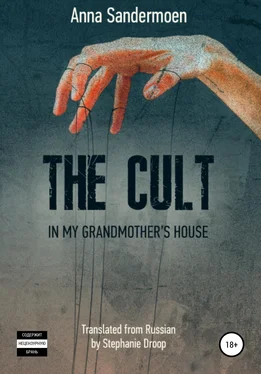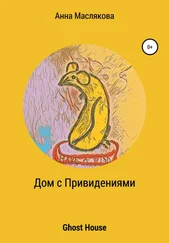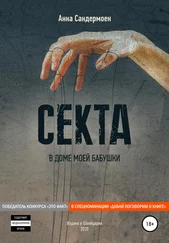HOW SCARED WE WERE OF MEDICINE
It wasn’t just the Zionists who were our enemies, it was doctors too. The words “medical”, “pills” and so on were dirty words, almost curses. Nothing except our treatments of layering and psychotherapy (including mechanotherapy, in other words beatings) could help a person. In all the years I spent in the cult, I never once saw a normal doctor. I somehow also avoided the standard annual checkup at school. I know the Chief was terrified of dentists. Nobody to my knowledge ever visited the doctor, not for anything. All the adults had terrible teeth. In some sense it was good that I was a child and so couldn’t go totally to seed.
However, cases requiring medical attention were not all that rare in the commune.
For example, once while our children’s collective was living outside Moscow, I fell sprawling on my back from a swing; my back was so sore I could hardly move. I was taken away immediately on my own to the Chief’s apartment on Kotelnicheskaya embankment, in a prestigious part of Moscow. I stayed there alone for a while with several adults who (as normal) layered me. However, strangely, they did not scold me very harshly for having a sore back. I probably wasn’t up to it.
Once a boy managed to knock a boiling pot off the stove over himself, and he got immediately coated in panthenol as treatment. That medicine was only available nearby by chance, only thanks to the fact that we were living in the centre of Moscow at that time, in one of the parent’s apartments.
Another boy, when we were on the move somewhere, fell and scraped his whole naked torso on the hot metal grate we cooked on.
And once while working in the fields a girl was hit on the hands with a hoe.
One of our male teachers fell between the platform and a moving train, severely damaging his thigh and almost losing his leg.
One of our female teachers was attacked by a trucker who tried to rape her in the cab of his lorry.
And this is just what remains from my childhood memories.
However, to outsiders it must have seemed that we were all absolutely fine, never ill, that nothing ever happened to us and that we were always full of strength, despite our heavy labour and difficult circumstances. In fact, this was the whole point and message of our work: don’t spoil children, don’t raise them as little lords, let them work their arses off, suffer the slings and arrows, temper them in the fire!
But to an intelligent observer it was obvious that we fell sick no less frequently than other people, and maybe even more. It was just that the whole theme of illness was painstakingly hushed up around us. Whenever anyone fell ill they were rapidly quarantined, so rapidly that not even others in the cult noticed. If for some reason they couldn’t be quarantined, they were scolded for their wrong thoughts, bad attitude and behaviour.
People even died like this. As a child I was always surprised that the fact of a person’s death was so quickly glossed over. There was never any public mourning or grief, never anything special or solemn – nothing that should by rights conclude the life of a worthy person, or so it seemed to me. Somehow no one was up to it.
However, when Brezhnev died, we were obliged to grieve. But the death of the Chief’s youngest daughter’s newborn baby was put down to the cold weather. Not to the fact that his mother had wrong thoughts, or that she was a perverted woman, or that she had done something wrong to the baby, but to the fact that there was frost outside: the baby had quite simply and routinely frozen in his pram during a nap. It was the frost that was guilty. The chosen ones are excused everything.
When I was first writing my recollections (at age 23), I declared completely sincerely that, yes, seriously, despite everything, we were never ill. I really believed that. But now, with the years, remembering our life then in more detail, and through talking with other former cult members, I uncovered facts which as a child I had never even known. In fact, as often happens, much was hidden from the children intentionally.
I came to see that it is important to fact-check our childhood impressions.
WHO REMEMBERS THEIR CHILDHOOD IN THE USSR
Here in Switzerland, I know a Russian lady who is surprised every time I mention the USSR with ill will. “But what was so bad about it?” she says, “Soviet people had everything. Even if it wasn’t much, everyone had a roof over their head, free education and medicine, a job, a salary. Everything stable and predictable. Is that not heaven?!”
True, it came out later that in the USSR she had lived in her parents’ apartment, and her dad was in the army, so they were in a very privileged layer of society and had more or less enough. (They were the total opposite of our family, which was headed by an enemy of the people). That aside, her recollections of the Soviet Union are tainted with childish romanticism. Children do not see the complex relationships in social phenomena. We begin to notice and understand them only with years and experience.
This is why it is so important in adulthood to mentally return to our childhood, to reevaluate what happened then. This is why I am writing this book: I want to understand what was not right and how to make sure nothing similar happens again, either with my own children or other people’s.
THEATRE, OR ART THERAPY
There was never enough living space, and still more and more people kept joining the collective. We had to find somewhere to set up and conduct our activities. No one lived in the clinic in the centre of Dushanbe – that was where the adults worked. We lived in various apartments donated by the parents of children in the commune. My grandmother’s apartment was the headquarters, where the management lived.
Besides the speeches, layering and mechanotherapy, we also received other methods of treatment, such as art therapy: the commune had its own amateur drama group. The Chief said that theatre was a powerful psychological corrective agent. By acting on a stage, a person becomes liberated, loses their fear of appearing in public, and learns how to be sincere.
We were invited to appear on stages in the local halls where we rehearsed, and then we went on tour over the whole country. During my early days in the collective we put on Edmond Rostand’s “Cyrano de Bergerac”. By that time we already had lots of people. They came from over the whole Soviet Union: from Moscow, Leningrad, Dmitrov, the Urals, Siberia, and of course many were from Dushanbe.
I really liked the theatre. It was interesting. Sometimes we rehearsed for days on end and simply lived on the stage and in the wings. And we received our treatments too: we were tapped and layered right there on the floor in the wings.
We had a large repertoire: we could perform about 20 different plays.
One time in the assembly hall of one school we were putting on “Dunno in the Sun City”, a story about the loveable children’s character Dunno or Neznaika created by Nikolai Nosov. I was playing Mushka. In the hall sat my parents, who had arrived for a short visit. The Chief was also watching our play. In the flow of a rehearsal he stopped us. He often did that, to start his latest speech, discussing the behaviour of this person or that person.
On this occasion the Chief was disgruntled with me. He spun a long speech, whose point I can’t remember. Then he told my parents to have a word with me. Mum and dad led me into an empty classroom, gave me a long explanation, of which I remember absolutely nothing, then sat me on a chair. Mum twisted my arms behind the chair’s back and held them so I couldn’t free myself, while my dad repeatedly beat me in the face. My nose started bleeding heavily, and my dad just kept hitting me. Later I returned home to the commune without my parents, took off my favourite dress and soaked it in a bath of cold water, but still couldn’t get the blood out. I had to throw it away.
Читать дальше












